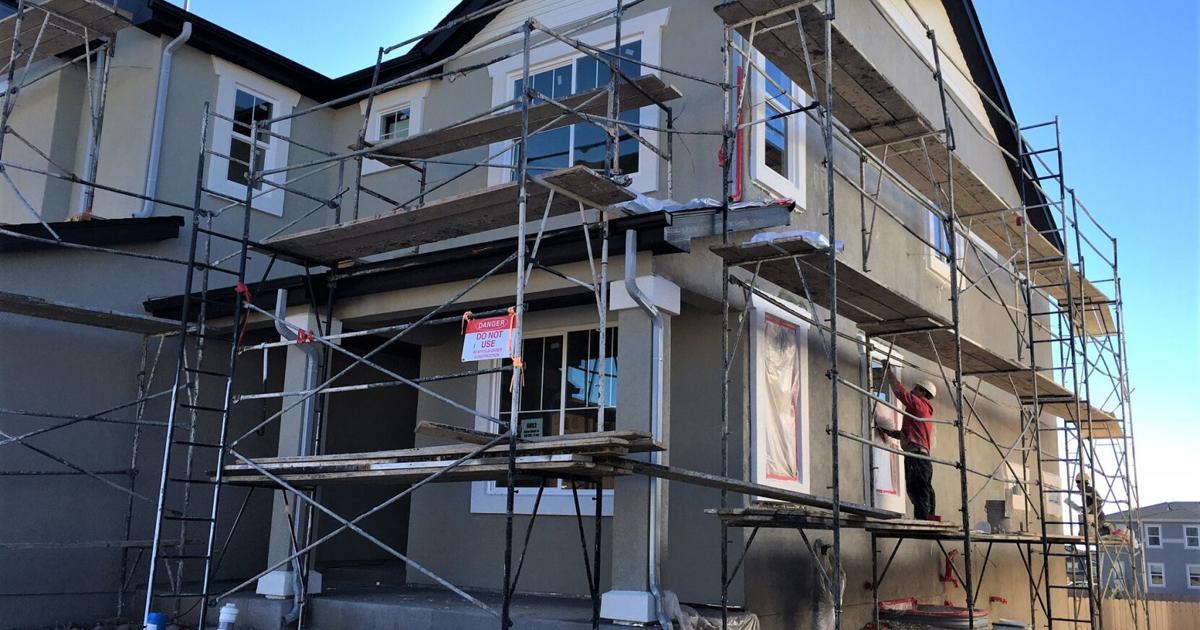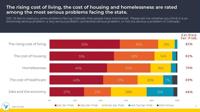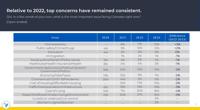The cost of living and housing affordability remain top concerns for Coloradans, based on results from the 4th Annual Pulse Survey commissioned by the Colorado Health Foundation.
Concerns about politics, homelessness and public safety were not far behind, however. And an open-ended question on respondents’ top concerns showed that water, climate change and wildfires were just as much of a concern as the cost of living.
The poll was conducted by two firms working together: liberal-leaning FM3 Research and conservative-leaning New Bridge Strategy.
The Colorado Health Foundation said in a statement last week that the results are consistent with recent polls and analysis that show Denver and Colorado cities, recently considered some of the nation’s most desirable and livable cities, are now dropping further down the rankings.
“Ultimately, the concerns and changes detailed in the 2023 Pulse poll can provide insight into how Colorado will evolve in the years to come,” the Foundation said.
The cost of housing has been a growing concern since 2020, according to the findings.
The survey found that housing costs considered an extreme or very serious problem rose from 67% to 82% between 2020 and 2023, with 51% of respondents citing it as an extremely serious problem in 2023, compared to just 37% in 2020. In a similar vein, the rising cost of living was rated as an extremely serious or very serious problem by 85% of respondents.

Housing concerns were not just about finding housing. Respondents also fear keeping the housing they have or having to rely on family or friends to share the burden.
Nearly 3 in 10 respondents (28%) said they were worried about losing their home in the next year because they couldn’t afford rent or a mortgage. This number is up 6% from 2020.
About 15% of respondents either moved because they couldn’t afford housing, or lived with a roommate, friends or family when they preferred not to.
For Gen Zers, the oldest of whom are 26, almost a third said they had to live with a roommate or friend to pay rent or a mortgage.
Republican pollster Lori Weigel of New Bridge Strategy said, “Looking to the future, 83% of respondents who are parents said they were worried their children wouldn’t be able to afford to live in Colorado in the future. It’s something we used to see in terms of economic opportunity in small, rural states, but seeing parents in every region of the state and at every income level concerned that their children may not have a future here is truly austere.
As for solutions, respondents suggested increasing tax credits for low-income Coloradans to help with the cost of living, government investments to stimulate the economy and create better-paying jobs, and increasing taxes on high-income earners—those earning $500,000 or more a year—and directing those taxes toward housing, health care, and education. Respondents of all demographic and political ideologies supported the top two, although only 34% of Republicans supported higher taxes on top earners, the survey found.
To address the cost of housing, respondents supported reducing property taxes for those on low or fixed incomes; ensure that landlords cannot increase rents too quickly; investing in homelessness prevention programs; and make it harder to evict tenants who have not violated their leases. This was the subject of a Invoice at the 2023 General Assembly, but he was not presented to the governor’s office.
Respondents also supported some of the concepts considered by the General Assembly in 2023, such as changing zoning laws to build more housing near employment and transportation hubs; requiring developers to build more affordable housing; and accelerating permits and inspections for affordable housing development.
The survey also found that Coloradans were concerned about two issues in 2023 that had not been identified as concerns in previous surveys: gun violence and abortion.
The issue that fell the most as a concern was COVID and the pandemic, from being of primary concern in 2020 to not at all of concern in 2023.

“COVID-19 hasn’t been the only contagion that has swept through Colorado in recent years,” Weigel said. “In the space of three years, housing costs have gone from being the concern of local hill station workers to a top-tier statewide issue. Across all regions of the state – from the Eastern Plains to the Front Range to the Western Rim – and with virtually every demographic group, the cost of living and the cost of housing are the great unifiers at the top of their minds.
Democratic pollster Dave Metz, president of FM3 Research, added, “Worries about the cost of living aren’t just a source of anxiety for Coloradans today — they’re also clouding their hopes for the future. Today, many Colorado residents face real challenges – nearly 2 in 5 people are “just getting by financially” and more than a quarter fear losing their home because they can’t afford it. But looking to the future, the vision is even bleaker. Most renters who want to own a home doubt they’ll ever be able to buy one in Colorado, and more than 4 in 5 parents worry about whether their kids will be able to afford to stay here.”
The survey was conducted by telephone and online from April 8 to May 3. Of the 2,639 adult respondents (18 or older), 24% identified as Democrats, 21% as Republicans and 43% as independents. The others did not identify themselves or were not registered to vote.
The population sample included oversamples of Black/African American, Native American/Native, and Asian American Coloradans, as well as residents of Pueblo County.
The margin of error was plus or minus 2.2% at the 95% confidence interval.




